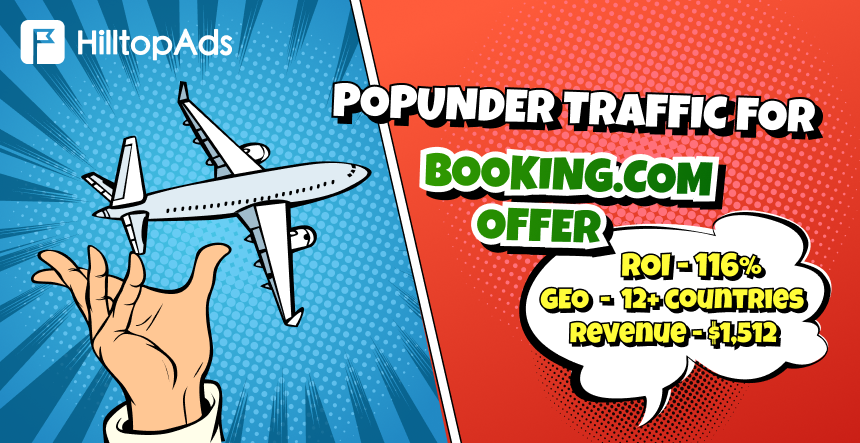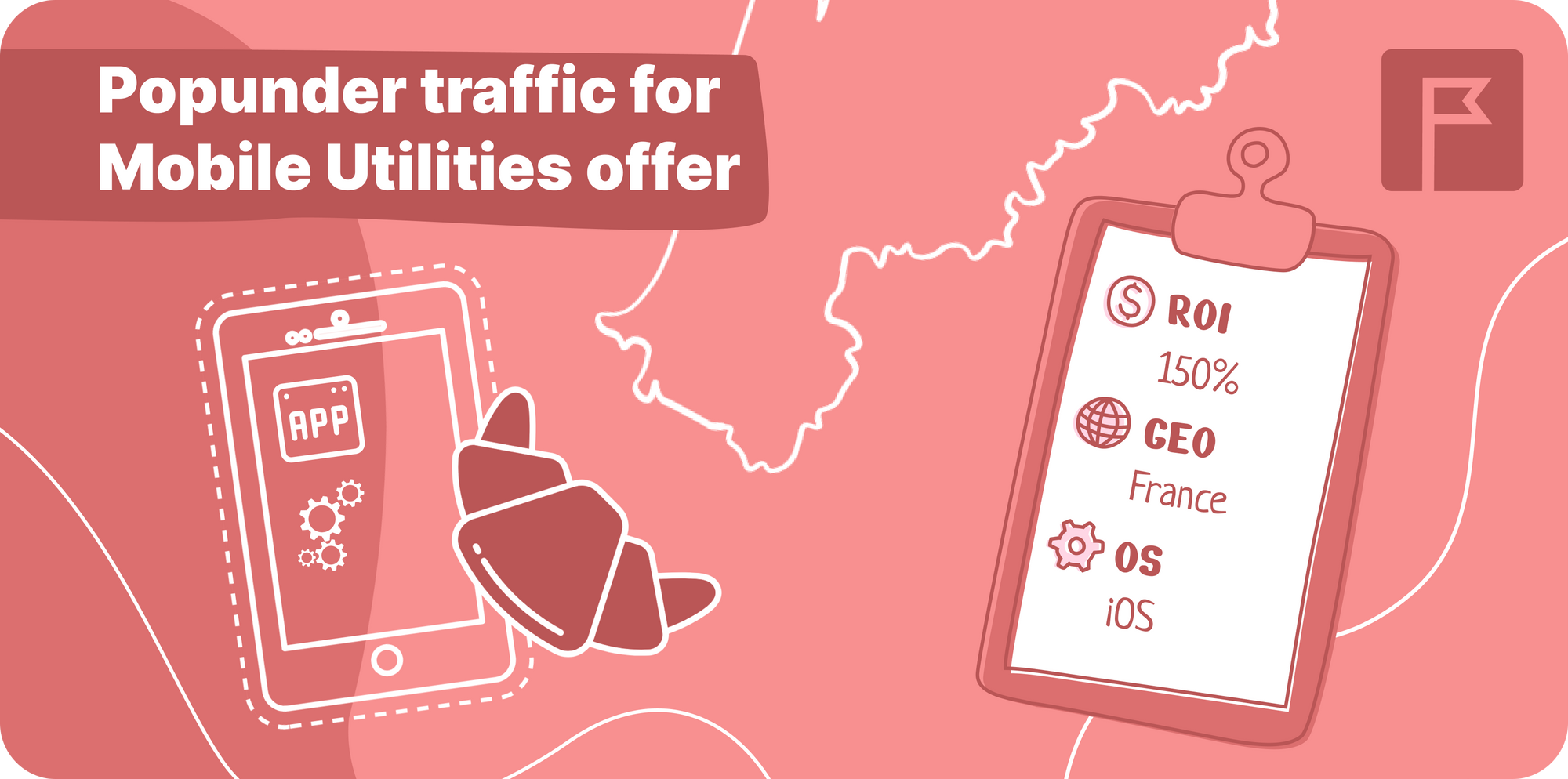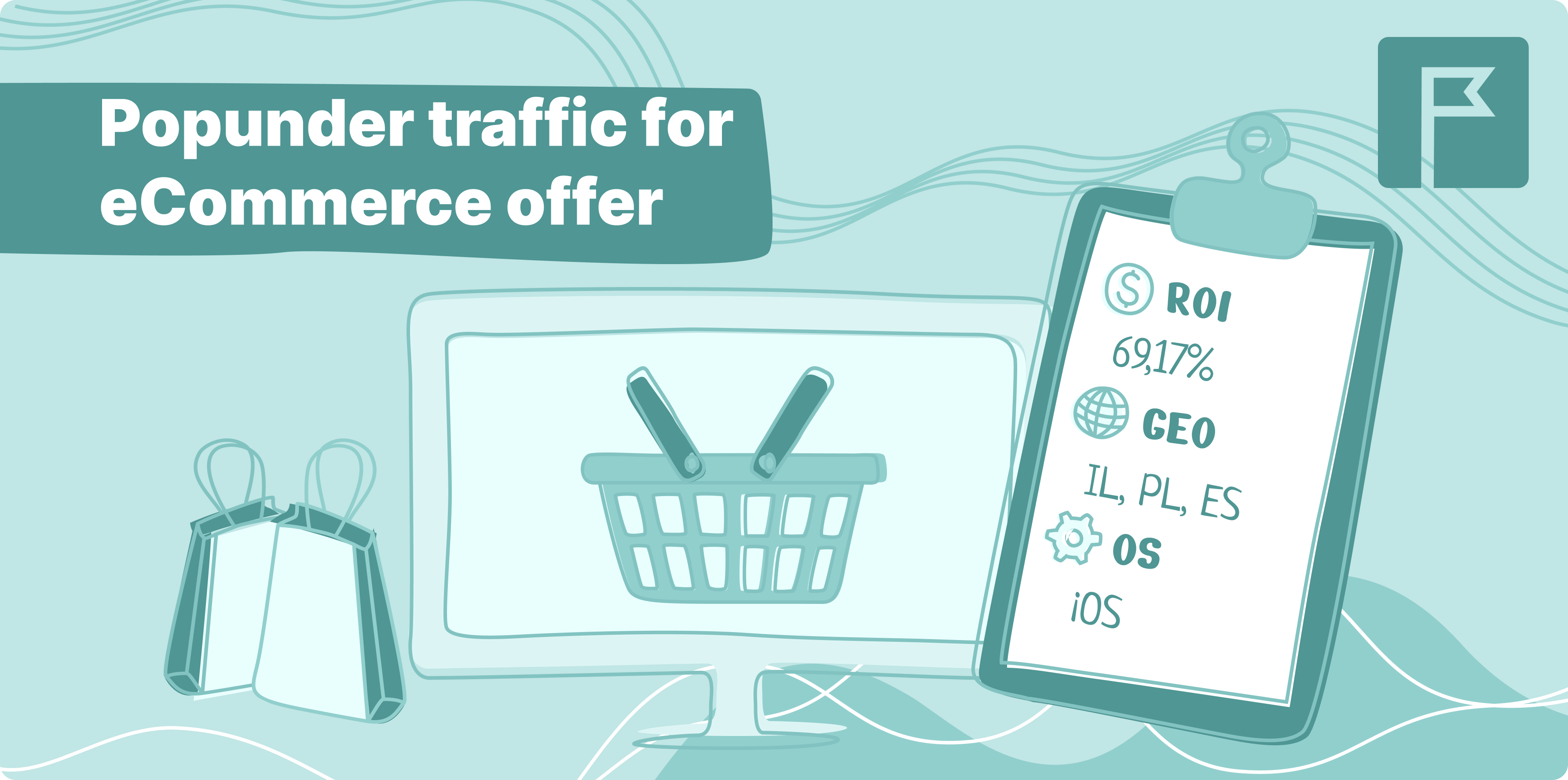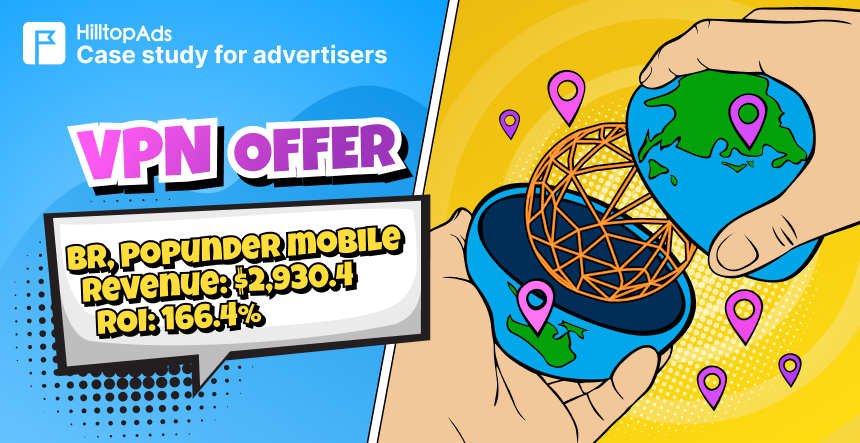Today, we’re exploring the eCommerce niche and looking at ways to profit from offers related to travel, rentals, and more. While this isn’t the hottest sector in web traffic arbitrage, it definitely has its potential. That’s why we’ve put together some solid tips on how to succeed in travel-related traffic arbitrage in 2025.
Not sure which offer to choose and hesitant to go with the most popular ones like AliExpress or Utilities? There could be many reasons — not everyone grew up learning Chinese (😁) or is deeply familiar with digital tools. But don’t worry! There are plenty of interesting offers out there that you can promote globally without being limited by specific GEOs. So, by all means, research and test, and don’t be afraid to jump into the global market!
Oh, and don’t forget to check the rest of our case studies on AliExpress and Utilities offers:
Key Points
Offer: Mainstream Aggregator
GEO: IT (Italy), GB (Great Britain), FR (France), PL (Poland), TH (Thailand), DE (Deutschland), SA (Saudi Arabia), CZ (Czech Republic), NL (Netherlands), ES (Spain), AU (Australia), IL (Israel)
Traffic: Mainstream High and Medium Activity
Ad Format: Popunder mobile
Ad campaign period: 26 August – 8 September
Revenue: $1,512.62
ROI: 116%

Start working with HilltopAds
so that we can talk about your success in the next case.
A bit about the vertical
Even if you’ve never worked with travel products, you can quickly get the hang of this niche. Here’s where to start and how to get going.
Traffic arbitrage in the travel niche has proven to be really profitable, as we and our partners can attest. This niche offers enormous potential for newcomers because travel is seen as a luxury people dream about and prioritize, even during tough times. Unlike fleeting trends, the desire to explore new destinations has always been a part of human nature and doesn’t fade away.
The travel industry offers a blend of luxury and necessity, providing a reliable foundation for sustained growth. As long as people seek unique experiences — the travel niche will remain a thriving space for arbitrage. Whether it’s flights, tours, or accommodations, the travel niche will always have an audience that’s eager to engage and spend. For those looking to enter the field, now is a great time to capitalize on this ever-present demand.
According to statistics, Europeans travel 2-3 times a year, and the same trends are repeated in other geographical regions. This consistent demand offers a consistent source of traffic arbitrage. You must diversify your strategy for the best possible success by experimenting with different traffic sources — organic, paid, or social — and different offers.
To maximize earnings, it’s essential to choose the type of product you’ll be promoting — airline tickets, hotels, tours, insurance, etc. Each of these has its own commission rates, but don’t focus solely on the highest one. High rates often come with more expensive advertising costs, which means higher expenses.
Instead, try out various product types or at least a few different ones, and after a month of testing, identify the most profitable option for you. Once you find what works best, concentrate on that niche. Also, consider focusing on specific regions — like popular departure or destination cities — and plan your ads around key travel times like New Year’s or Easter to make them more relevant.
About Booking.com
Booking.com is a leading online travel agency and it offers a vast range of accommodations, including hotels, apartments, and vacation rentals. For media buyers, Booking.com provides a lucrative opportunity through its affiliate program. You can promote offers (such as hotel or apartment bookings, apartments, excursions, car rentals, insurance, transfers, cruises, and more) via your landing pages. By attracting users who complete bookings, affiliates earn commission for each successful transaction. This model allows you to monetize traffic from an audience interested in travel.
Advantages for affiliates
Wide range of offers
Booking.com doesn’t just offer hotels; it has many other services, giving you the chance to diversify your promotions.
Global reach
With a worldwide presence, Booking.com lets affiliates target international markets.
Let’s move on to the central part of the case and review the promotion strategy.
Strategy
In 2023, Booking Holdings reached record-breaking figures, with total bookings reaching $40 billion, 24% up from last year’s same period. A significant trend shift to bookings through smartphone use was noticed, and bookings exceeded 50% through the use of apps, indicating the shift in consumer trend.
Based on this trend, we’ve chosen to focus on mobile traffic. In mobile arbitrage, it’s crucial to ensure your product has a mobile-friendly version. Globally, 32% of travelers used mobile sites and 23% used apps. By 2031, the mobile booking market is projected to grow to $612.5 billion. Mobile offerings are the future of traffic arbitrage, especially with the growing popularity of online travel.
For promoting Booking.com offers, popunder mobile ads are an ideal choice. This ad format appears behind the main browser window and becomes visible only after the main window is closed. Because it’s less intrusive, this format is less likely to distract users, thereby increasing engagement. Popunder ads are particularly advantageous for mobile traffic due to their high visibility and lower competition compared to other formats. They also demonstrate higher conversion rates and lower CPM, making them perfect for promoting travel offers like those from Booking.com.
Here you will find more detailed information:
To summarize: we direct traffic to the advertiser’s site through predesigned landing pages, which open a few seconds after interacting with the main page.
A useful tip is to ensure that when a user clicks on a link in the landing page, they are immediately taken to the exact information promised in the ad. Avoid making users search for details on their own. This makes the experience smoother, builds trust, and increases the chances they’ll convert.
Geography
The travel niche is a highly lucrative market, especially in Tier-1 and Tier-2 countries. Profit can be achieved through careful customer segmentation, precise targeting, remarketing, A/B testing, and a deep understanding of customer pain points. The more precise the segmentation, the quicker the results. Product-specific creatives and precise focus are also necessary.
When setting up the ad campaigns, choose the respective GEO and the respective keywords. Consider the tourist character depending on the seasons. Plan your content in advance, considering both the seasonal trends and the interests of the target GEO. For example, Turkey attracts tourists in the summer, while Thailand is more popular in the winter. Holiday periods, like Christmas or Easter, are also good opportunities for special offers.
Also, periodic restrictions in the travel industry should be considered. For example, during the COVID-19 pandemic, many countries closed their borders. Geopolitical events or natural disasters can also impact travel, so staying updated on current events helps you avoid wasting your budget on regions affected by crises.
In our case, we selected 12 countries for testing to identify where the ads perform best: Italy (IT), Great Britain (GB), France (FR), Poland (PL), Thailand (TH), Germany (DE), Saudi Arabia (SA), Czech Republic (CZ), Netherlands (NL), Spain (ES), Australia (AU), and Israel (IL). Despite the diversity, these countries share a few key characteristics:
High digital penetration
People in these countries are active internet and mobile users, making them great for online advertising.
Diverse markets
A mix of developed and emerging markets with different consumer behaviors and purchasing power.
Tourism popularity
Many of these regions are highly sought-after in the travel and e-commerce sectors.
Additionally, localized advertising content is required in these regions due to differences in language and cultural traditions.

Use the recommendations from this case
to earn even more money with HilltopAds!
Settings of the ad campaign and its Optimization at HilltopAds
Before you start running ads on HilltopAds, you’ll need to sign up as an advertiser. You can register using this link.
Once you’re registered, here’s how to create your ad campaign:
- Go to the Manage Campaigns section
- Click the Add Campaign button
- In the campaign creation area, choose the Popunder mobile ad format
- In the Traffic Channels section, choose Mainstream High and Medium Activity
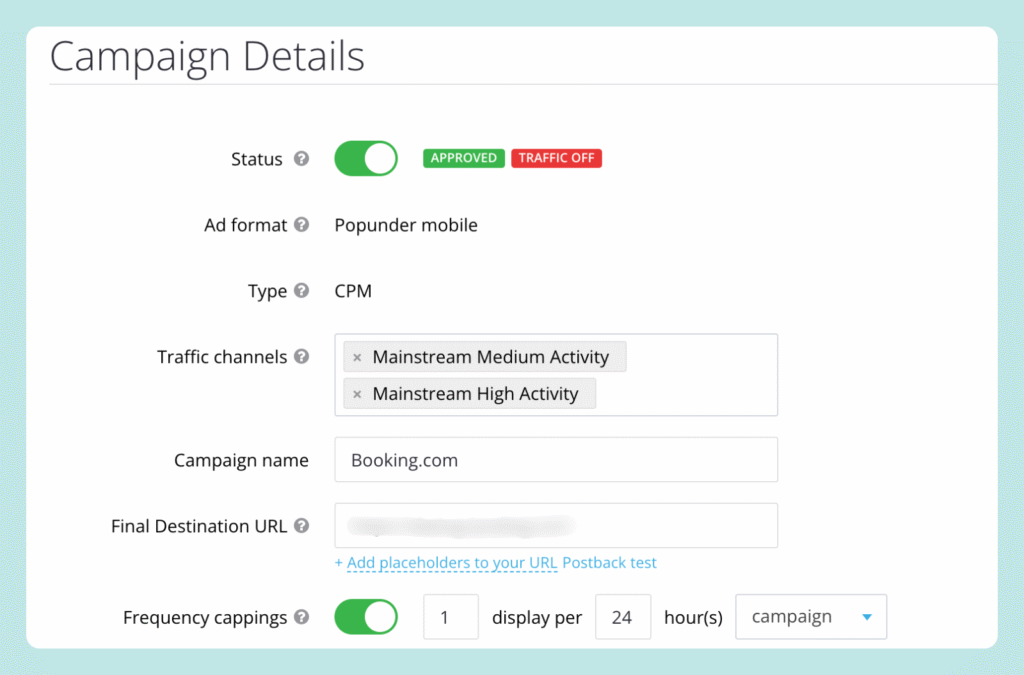
Next, it’s crucial to configure the Postback to track your ad campaign’s performance. For a detailed guide on using Postback and the available placeholders, check out our documentation.
To properly track conversions and source IDs, you need to add specific parameters to the final URL of your offer. The click_id parameter is used for tracking conversions, while zone_id helps identify the traffic source.
For a detailed setup guide and a full list of available parameters, check out our guide:
Next, we set the necessary targeting settings:
- GEO — IT (Italy), GB (Great Britain), FR (France), PL (Poland), TH (Thailand), DE (Deutschland), SA (Saudi Arabia), CZ (Czech Republic), NL (Netherlands), ES (Spain), AU (Australia), IL (Israel)
- Device — mobile/tablet
NOTE: For each GEO, we crafted a dedicated advertising campaign, ensuring a tailored approach for optimal results. Below, you’ll find an example of one of these campaigns, illustrated through the screenshots.
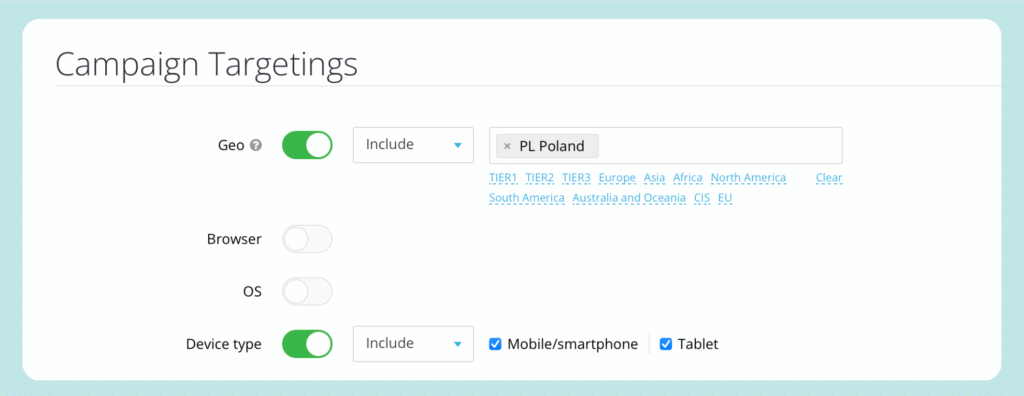
You can also configure campaign filters and allow/disallow Proxy and WebView traffic from the campaign. However, in our case, for the Mainstream Aggregator offer, we have included webview traffic:
- Proxy — disallow
- WebView — allow
WebView is software that opens a landing page with an offer within a mobile application. In other words, upon opening the application, users are directed to a single-page website with the offer.

You can set limits according to your daily and overall advertising budget, but the daily limit should not be less than $20. During the testing phase, we decided to set a daily campaign limit of $50 for all days for each GEO.
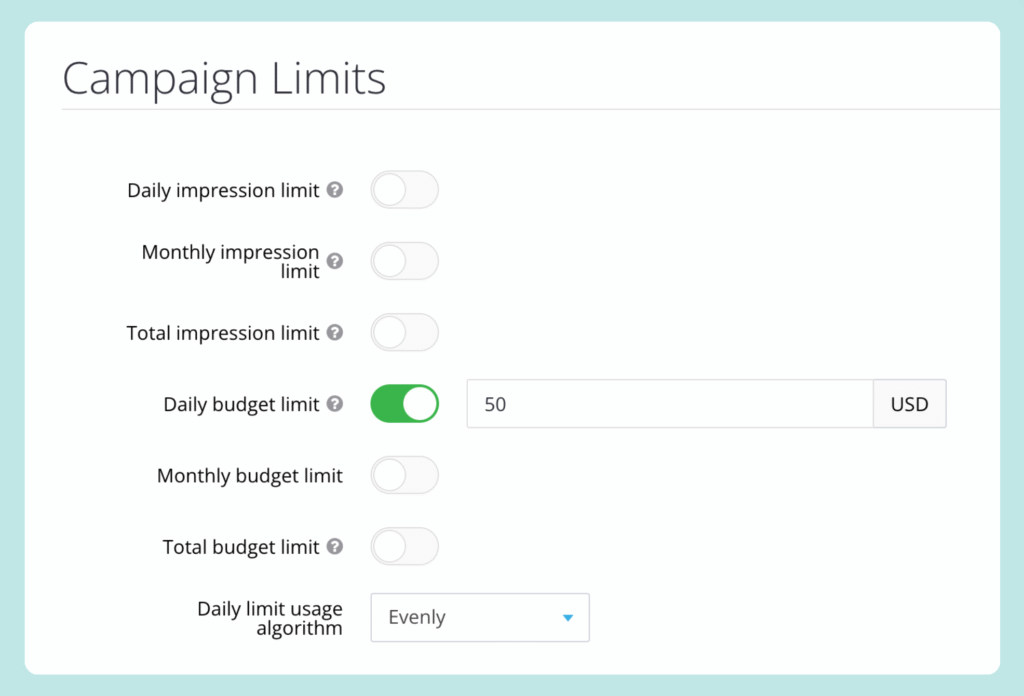
If needed, you can also customize the ad display schedule. The last step before launching your campaign is setting the cost per thousand impressions (CPM). To determine the optimal rate, refer to the Traffic Volumes graph in the top left corner, which provides premium, minimum, and recommended CPM values.
We set a CPM bid of $2.3 for each campaign to ensure accurate and consistent performance data, aiming for a clear understanding of the campaign’s effectiveness.
Our advice: to test a new offer, start with the recommended CPM. This will show whether the offer is effective and whether the campaign needs optimization.
Optimization and intermediate results
We applied the automatic optimization tool from the first day of the campaign, setting the analysis parameters to 48 hours with a threshold of 1,500 impressions and a number of conversions of less than 1. This allowed us to reduce spending on inefficient ad sources and focus the budget on more promising audience segments.
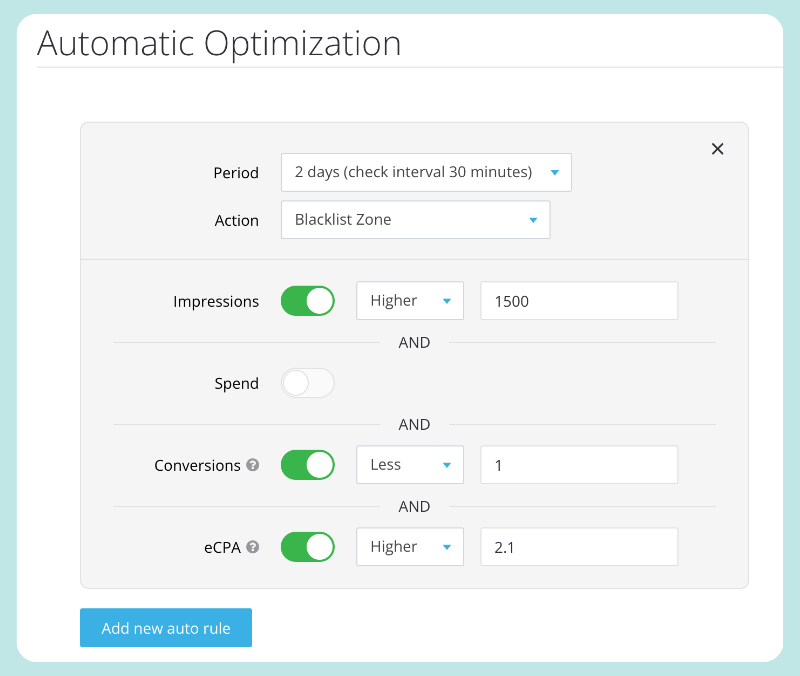
To learn more about the capabilities of automatic optimization with HilltopAds, you can check out the article on the website:
To filter out unprofitable ad zones from your campaign, you can use the Auto Optimization tool. This feature automatically identifies and excludes low-performing traffic sources, ensuring that non-profitable zones are added to your BlackList for better efficiency.
Results
The most successful GEOs were Czech Republic and Poland. After a focused 14-day optimization of the advertising campaign, we achieved the following results:
- Total Costs (Spent) — $700
- Total Earnings (Profit) — $1,512.62
- ROI (Return on Investment) — 116%
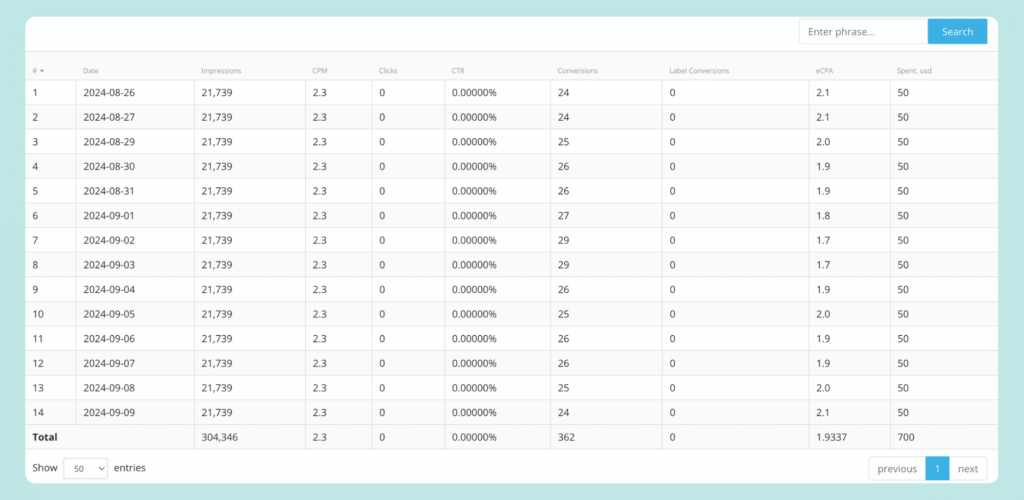
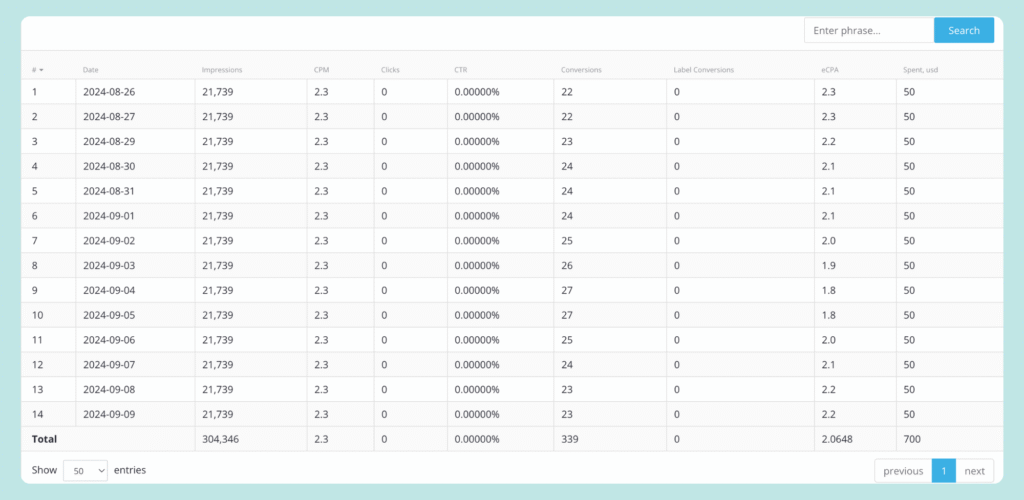
ROI is one of the key indicators in digital marketing that allows you to assess the profitability of an advertising campaign. In simple terms, ROI shows you the percentage of advertising investments that you have managed to recover through earnings from the ads.
The formula for calculating ROI is:
ROI = (total earnings – total cost) / total cost * 100%
In this case, the return on investment is 116%.
Net Profit
The net profit derived from the Mainstream Aggregator offer launched on the HilltopAds platform illustrates compelling return on investment. From the total revenue of $1,512.62 and ad expenditure valued at $700, the campaign yielded a net profit valued at $812.62.
This emphasizes the efficiency of the HilltopAds advertising network as an effective platform to market offers such as Mainstream Aggregator in Tier-1 countries.
Conclusion
Success in traffic arbitrage heavily relies on experimentation and meticulous campaign optimization. It starts with selecting the right GEOs but extends to fine-tuning every detail, including manual bid adjustments and controlling ad frequency. If the platform you are working with supports A/B testing, it’s important to fully leverage this feature. For example, you can test the following hypotheses on your traffic:
- Does the “Buy now before the price goes up” strategy work?
- How effective is situational marketing?
The key to success is continuous work and ongoing experiments. This applies not only to earning through traffic arbitrage in the travel niche but also to maintaining a high level of revenue.
A winning strategy for arbitraging Booking.com offers isn’t just about smart budgeting and picking the right GEOs—it’s about constantly testing new ideas. By experimenting and refining your approach, you can find what works best for different audiences and maximize your earnings.
Ready to repeat the success? Launch your ad campaign and apply a promo code ECOMM20 to get +20% to your first deposit of at least $100.


















